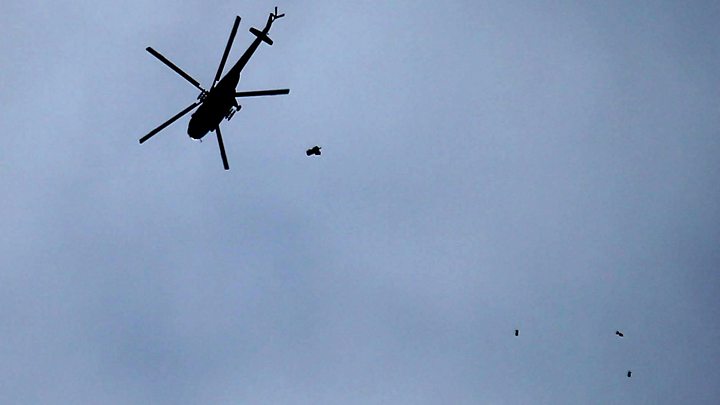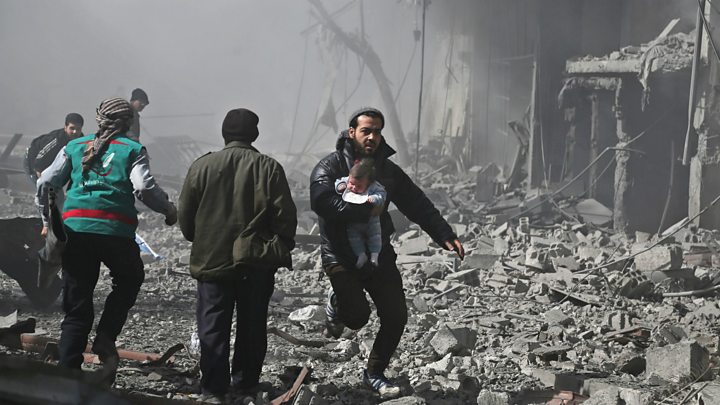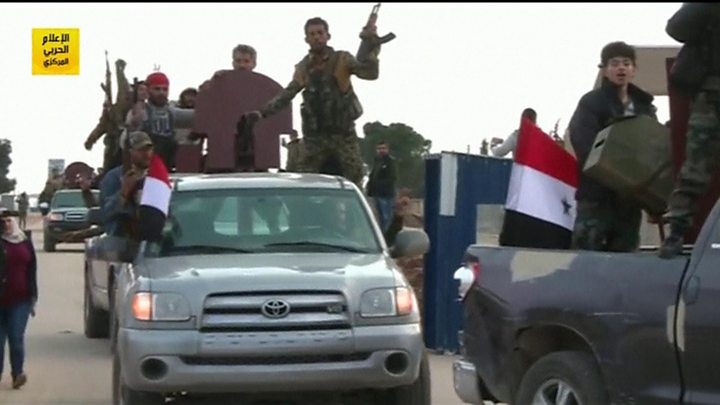
A doctor working in the Syrian rebel enclave of the Eastern Ghouta says the situation is “catastrophic” – and he believes the international community has abandoned the people living there.
“We don’t have anything – no food, no medicine, no shelter,” Dr Bassam told the BBC. “We don’t have bread. We don’t have anything.”
“Maybe every minute we have 10 or 20 air strikes,” Dr Bassam said.
Three days of bombing in the area reportedly killed at least 250 people.
The Syrian military says it is trying to liberate the area from terrorists – but it has also been accused of targeting civilians.
“They targeted everything: shops, markets, hospitals, schools, mosques, everything,” Dr Bassam said. “I will treat someone – and after a day or two they come again, injured again.”
“Where is the international community, where is (the UN) Security Council… they abandoned us. They leave us to be killed,” he said.
What’s happening in the Eastern Ghouta?
Pro-government forces – backed by Russia – intensified their efforts to retake the last major rebel stronghold on Sunday night.
Image copyright
AFP
A makeshift hospital was set up in Douma – one of the several towns under bombardment
More than 50 children were among the dead, according to activists. About 1,200 people were injured.
The UN has called for a ceasefire to allow humanitarian aid to be delivered and the wounded to be evacuated.
The Eastern Ghouta is dominated by the Islamist faction Jaysh al-Islam. But Hayat Tahrir al-Sham, a jihadist alliance led by al-Qaeda’s former affiliate in Syria, also has a presence there.
Syrian state television reported that at least six people living in government-controlled areas of eastern Damascus were killed earlier this week – and 28 others wounded – by shells fired from the Eastern Ghouta.
The Syrian military said it carried out “precision strikes” on areas from which the shells were launched.
What can the international community do about it?
By Jonathan Marcus, BBC diplomatic correspondent
The catastrophe in eastern Ghouta is unfolding as the war in Syria enters a new and even more dangerous phase. The international community is impotent to act, not least because key members of that community are deeply implicated in what is going on, not least Russia.
Other regional players like Turkey and Iran are acting to secure their own long-term strategic interests. So too is Washington though its goals seem uncertain now that IS is defeated and the Assad regime remains in power.
There is no consensus in the international community, no great leadership in evidence, and no shared sense of what Syria’s future should be. Just as the international community has failed to halt the use of chemical weapons, so too it has been unable to secure humanitarian access to those at greatest risk.
How bad is the situation in the enclave?
Image copyright
Getty Images
The Eastern Ghouta town of Hamouria has been heavily bombarded
The violence in the region – designated as a “de-escalation zone” by Syria’s main allies, Russia and Iran, as well as Turkey – is the worst since 2013, when a chemical attack killed hundreds of people, activists say.
They say at least 10 towns and villages across the Eastern Ghouta came under renewed bombardment on Tuesday.
“People have nowhere to turn,” a local doctor told the Union of Medical Care and Relief Organisations, which supports medical facilities in the Eastern Ghouta
“They are trying to survive but their hunger from the siege has weakened them significantly.”
Mr Moumtzis said at least six hospitals had been hit in the area on Monday and Tuesday, and warned that such attacks might amount to war crimes.

The government has allowed one humanitarian convoy into the Eastern Ghouta since late November, and there are severe shortages of food.
A bundle of bread now costs close to 22 times the national average and 12% of children under five years old are said to be acutely malnourished.
What else is going on in Syria?
Meanwhile, pro-government fighters have been sent to the Kurdish enclave of Afrin in northern Syria to confront an offensive by Turkish troops and Syrian rebels.
Turkey fired shells near the advancing columns, which, it says, forced the pro-government fighters into retreat.
Afrin lies just south of the Turkish border. Turkey is trying to oust the Kurdish YPG militia, which controls the area and which has called on the Syrian military for help.
Syria has denounced the Turkish offensive as a “blatant attack” on its sovereignty, while Turkey has insisted it will not back down.

Syrian government forces are also carrying out offensives on the rebel-held north-western province of Idlib. The UN says more than 300,000 people have been displaced by the fighting there since December.
Syria war: Eastern Ghouta bombing ‘catastrophic’}

